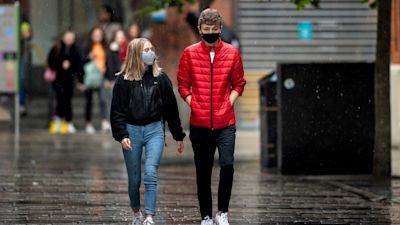Covid: PM 'confident' restrictions in England will end on July 19 - can he be so sure?
Tom Clarke
Former Science Editor

Since the Delta variant, which originated in India, first appeared in the UK and coronavirus cases started to rise again, we’ve been looking for some kind of certainty about where the Covid outbreak is going.
The only guide available to public health officials and the government they advise has been computer models of the outbreak. On Monday, we got to see what they’re forecasting. On Tuesday, ITV News caught up with Professor Graham Medley, the man who chairs the government’s team of disease modellers. First off, those looking for certainty about the coming weeks will be disappointed.
Professor Medley explains why it is difficult for experts to predict how many infections will come in the next few weeks
"With the new variants, how the vaccines work with the new variants and then how people behave when different measures are moved all introduce uncertainty in the future," Prof Medley told ITV News.
"But we can use the models to understand what the patterns are. And the central pattern is that the more people who get infected before they get the vaccine, the more will end up in hospital".
According to Professor Medley, it's likely the UK will see another wave of infections, however, it's hard to predict how significant said wave will be. Does it matter how high infections grow and hospitalisations get if they don’t translate into severe disease and death? Well given the continuing rollout of the vaccine and a lack of data on deaths from the Delta variant, fatalities are hard to predict.
How many deaths from the Delta variant do modellers predict?
Professor Medley said: "None of the models are getting up to death rates which were approaching the previous waves, of 1,000 a day.
"On the other hand, most of them are saying that we'll be more than 100 a day. So that's really the kind of the range that I think we'll be expecting." Ultimately, a lot could depend on whether vaccination rates keep pace with infection rates. "Vaccines might win this race and might win this battle," Professor Medley said.
Professor Medley says cases still might be rising by July 19
"If they don't then it will be because the infection rates get so high so that we end up you know with tens, hundreds of thousands of people being infected every day and that just means that the risk for individuals, even though their risk is low, there's just so many of them being infected." The government has strongly indicated that society will unlock on July 19. But it’s far from guaranteed that infections will be falling - although by then, we should be able to see if they’re going to or not. "I still think we will have cases rising but we will know much more about the impact of those cases on hospitalisations and we will have vaccinated many more people. So we will be in a much better position in a month's time," he said.
Will July 19 be the end of restrictions...forever?
He added that the government will also be in a better position to make an informed decision about the next steps. And if there is a more positive note - given the scale of vaccination roll-out - there’s the hope this will be the last Covid lockdown we see. "I think there is a very good chance that this could be the last sort of significant wave that requires sort of central government attention in the way that the previous waves has," Prof Medley said.
"I think that there's a very good chance that in the future we will see outbreaks but much more limited, much more local, much more confined to different settings".